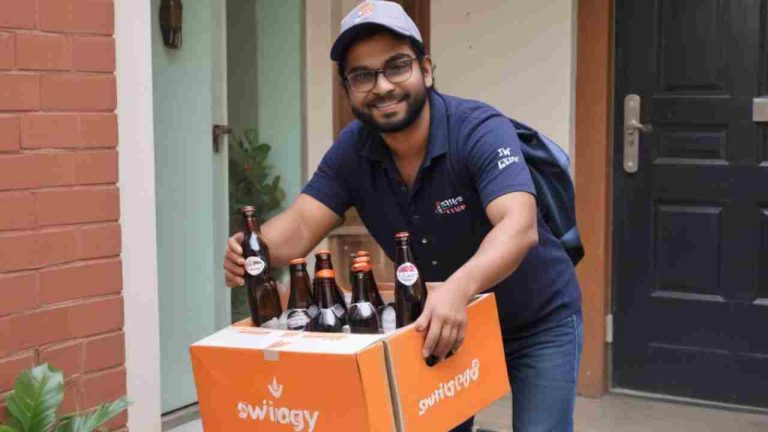Imagine sitting comfortably at home and ordering a chilled beer or a bottle of wine with just a few taps on your phone. This could soon become a reality in several Indian states including Delhi, Karnataka, Haryana, Punjab, Tamil Nadu, Goa, and Kerala. Online platforms like Swiggy, bigbasket.com, Zomato, and Blinkit are preparing to launch pilot projects for the home delivery of low-alcohol beverages such as beer, wine, and spirits. As the state authorities seek feedback from e-commerce platforms and spirits makers, this potential shift raises several important questions and concerns. Let’s delve into the heart of these issues.
Will This System Benefit the Drinking Population or Increase Alcohol Consumption?
The convenience of home delivery for alcohol presents a mixed bag of potential benefits and drawbacks. On one hand, it offers significant advantages for those who already drink responsibly. No more standing in long queues at crowded liquor stores or hauling heavy bottles home. For the elderly and people with mobility issues, this service could be a game-changer. It might also reduce the instances of drunk driving, as people may prefer to order in rather than risk a trip to the store after a few drinks.
However, the downside is equally concerning. Easy access to alcohol might lead to an increase in consumption. The barrier of having to go to a store physically acts as a deterrent for some, and removing this could lead to more frequent and impulsive drinking. This is especially problematic in a country where alcohol addiction and related health issues are already significant problems.
Will This Delivery System Erode the Ethical Belief Systems of Traditional Cultural States?

India is a country rich in diverse cultures and traditions, many of which hold conservative views on alcohol consumption. States like Tamil Nadu and Kerala have strong cultural values and ethical systems that often discourage public drinking and promote moderation. The introduction of home delivery of alcohol could be seen as a challenge to these traditional beliefs.
While modern conveniences often clash with traditional values, it is important to consider how this service will be perceived. Will it be seen as an erosion of cultural norms, or simply as an adaptation to contemporary lifestyles? Opinions are likely to be divided. Some might view it as a necessary modernization, while others could see it as a threat to the ethical fabric of their society.
Will This System Benefit the Delivery Platforms by Doubling Their Earnings?
For delivery platforms like Swiggy, Zomato, and bigbasket.com, the introduction of alcohol delivery could open up a lucrative revenue stream. Alcohol is a high-demand product with a large and diverse customer base. Adding it to their delivery services could significantly boost their earnings.
However, it’s not just about the potential for increased revenue. These platforms will also have to navigate regulatory hurdles, ensure responsible delivery practices, and possibly deal with increased scrutiny from both the public and the government. Balancing profit and responsibility will be key. If done correctly, it could indeed double their earnings, but they must tread carefully to avoid backlash and legal complications.
Will This Doorstep Alcohol Delivery Service Have the Possibility to Get Scammed?
With any online delivery service, the risk of scams and fraud is always present. The introduction of alcohol delivery adds another layer of complexity. There could be issues with verifying the age of the buyer, ensuring that deliveries are not made to intoxicated individuals, and preventing the resale of alcohol to minors.
E-commerce platforms will need to implement robust verification systems and strict delivery protocols to mitigate these risks. This might include using technology to verify age, training delivery personnel to handle sensitive deliveries responsibly, and working closely with law enforcement to monitor and address any fraudulent activities.
Will This Move from State Governments Spoil the Health of the Next Generation Youth Population?
Perhaps the most significant concern is the impact on the youth. Easy access to alcohol could lead to increased consumption among young people, who are more susceptible to peer pressure and risky behaviors. The glamorization of drinking culture through easy availability could exacerbate issues related to underage drinking, addiction, and long-term health problems.

State governments and delivery platforms must prioritize the health and well-being of the younger population. This could involve setting strict age verification measures, limiting the types of alcohol available for delivery, and running awareness campaigns about the risks of excessive drinking. Balancing convenience with public health is crucial to prevent long-term negative impacts on society.
Conclusion
The potential for home delivery of alcohol in India is a complex issue with no easy answers. It offers convenience and economic benefits but poses significant risks to public health and cultural values. As state authorities and e-commerce platforms explore this possibility, it is crucial to carefully consider the feedback from all stakeholders and implement robust measures to address the concerns raised.
Ultimately, the success of this initiative will depend on finding a balance between modern convenience and traditional values, between economic growth and public health. As we stand at the crossroads of this potential change, it is up to society, government, and businesses to navigate these challenges thoughtfully and responsibly. Only then can we hope to reap the benefits of this new convenience without opening a Pandora’s box of unforeseen consequences.
Readmore: Milk Made Without Cows: Can Technology Revolutionize the Dairy Industry? | From Ola Cabs to Ola Maps: Bhavish Aggarwal’s Vision for India’s Digital Transformation | Google Backs Namma Yatri in Strategic Move to Counter Ola Maps

